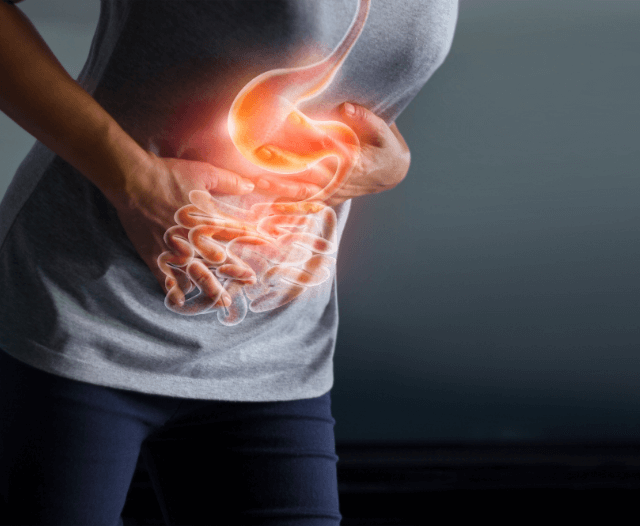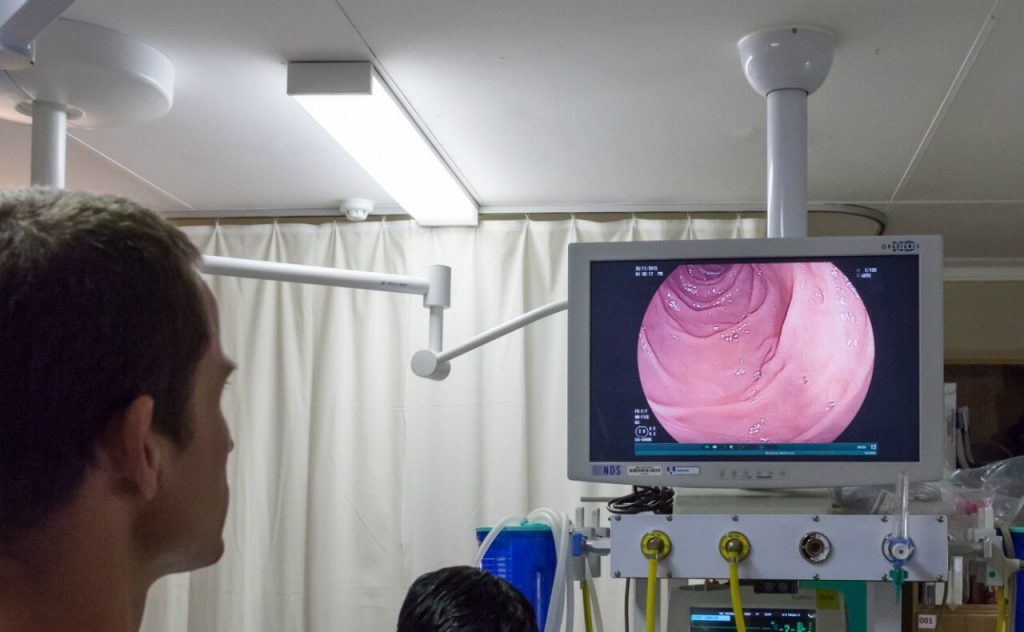Is it a normal stomach ache or is it IBS? Is it time to revisit your diet or is it time to visit a doctor?
If you’re asking these questions, here’s a quick rundown on what IBS really is, along with its causes and possible treatments.
What is IBS?
IBS is an abbreviation for Irritable Bowel Syndrome. It is a common disorder that affects the large intestine.
IBS is also known as a spastic colon, irritable colon, mucous colitis, or spastic colitis. It’s a chronic condition that can only be managed and not completely eradicated.
Signs and Symptoms of IBS
Irritable Bowel Syndrome symptoms typically include:
- Abdominal pain, cramping, or bloating that is typically relieved or partially relieved by passing a bowel movement
- Excess gas
- Diarrhea or constipation
- Mucus in stool
If you look at the symptoms, it’s easy to mistake IBS for another digestive condition – lactose intolerance.
However, lactose intolerant individuals experience similar symptoms such as bloating, diarrhea, and gas because they can’t process dairy as opposed to the cause of IBS.
The Causes of IBS?
Unfortunately, it’s actually not clear what causes IBS. However, there are different factors that contribute to it. Medical researchers and doctors have compiled a list and this includes the following:
- Intestinal Muscle Contractions
The intestines are lined with muscles that contract to move food across the digestive tract.
Contractions that are stronger and last longer than normal cause gas, bloating, and diarrhea, while weak intestinal contractions cause constipation.
- Abnormalities in the Nervous System
The brain is still a great medical mystery.
The abnormalities in the connection between the nerves in the digestive tract and its connection to the brain can cause greater discomfort when the abdomen stretches from gas or stool.
A poor connection can cause the body to overreact and cause pain, diarrhea, or constipation.
- Inflammation in the Intestines
People with IBS sometimes have a higher number of immune system cells in their intestines. This causes pain and diarrhea.
- Leftover infection
After a severe case of diarrhea, IBS can develop due to the high level of virus or leftover bacteria from the previous sickness.
- Changes in Microflora
Microflora is the “good” bacteria in the intestine. Studies suggest that an abrupt change in the gut’s microflora may cause IBS.

Due to the nature of its cause, IBS also manifests in different ways. According to Healthline, IBS can manifest with:
- slowed movements of the colon, causing painful cramping
- abnormal serotonin levels in the colon, affecting motility and bowel movements
- mild celiac disease that damages the intestines, causing IBS symptoms
What Triggers IBS?
IBS symptoms can be triggered by three different factors; (1) food, (2) stress, and (3) hormones.
- Food
Food allergies rarely trigger IBS symptoms. However, certain types of food like wheat, dairy, beans, and carbonated drinks trigger worse IBS symptoms.
- Stress
Do you know that stomach ache you get when you’re anxious and stressed? That’s similar to what happens when stress triggers IBS symptoms. Patients with IBS get worse symptoms during times of great stress.
- Hormones
According to studies, women are twice more likely to get IBS than men.
This might indicate that hormones and frequent hormonal change play into the role.
Women experience worse IBS symptoms during PMS or while they’re on their period.
Given this, it’s a manageable disease. Most people with IBS only have minor symptoms.
However, for others, the symptoms are significant and disrupt daily life. It lasts between three days to three months and varies from person to person.
When Should You Call Your Doctor?
It’s time to visit your doctor if you have a persistent change in your bowel habits.
While IBS is manageable, persistent symptoms may be an indicator of a much more serious disease like colon cancer.
According to Mayo Clinic, other serious symptoms include:
- Rectal bleeding
- Severe weight loss
- Iron deficiency anemia
- Unexplained vomiting
- Persistent stomach pain

If you’re experiencing all or any of these symptoms, it’s time to book that clinic appointment.
How is IBS diagnosed?
There is also no one way to diagnose it either. However, there are steps that doctors take to determine it.
First off, they’d take your medical history, conduct a full physical exam, and routine tests to rule out other conditions.
After other diseases are ruled out, you’ll most likely be tested for the following criteria:
1. Rome Criteria
The Rome criteria take into account the length of time and frequency that the abdominal pain and discomfort lasts.
It’s a check if the pain and discomfort happen once a week in the course of three months. It’ll also take into consideration the quality of stool and the frequency of defecation.
2. Manning Criteria
The Manning criteria focus on whether or not pain is relieved after defecation. It also checks on the stool consistency, mucus in stool, and incomplete bowel movements.
3. Type of IBS
When pursuing treatment, IBS can be categorized into three types: constipation-predominant, diarrhea-predominant, or mixed.
Aside from fulfilling these criteria, there are also other tests that your doctor might suggest to check if there are other infections or problems in your intestines. Here are some of these tests:
- Flexible Sigmoidoscopy
A flexible sigmoidoscopy is a procedure wherein the doctor inserts a thin flexible tube with a camera into the patient’s rectum.
It allows the doctor to see the lower part of the colon and check for any overgrown tissues that may need removal.
If you’re in Cape Town, Dr. Eduan Deetlefs offers flexible sigmoidoscopy. As a seasoned Gastroenterologist, Dr. Deetlefs has seen his fair share of IBS patients.

- Colonoscopy
Similar to flexible sigmoidoscopy, Dr. Eduan Deetlefs also offer this test and procedure in his clinic in Cape Town.
Flexible sigmoidoscopy and colonoscopy are similar in the sense that they both use an endoscope which is then inserted into the patient’s rectum.
However, unlike flexible sigmoidoscopy that only views the lower part of the colon, a colonoscopy views the patient’s whole colon for any abnormalities.
If they find any tissue growth and they may use tweezers or forceps to remove said growth. It will then be sent to the laboratory for a biopsy.
Other tests include CT Scan, X-ray, lactose intolerance tests, breath tests, and endoscopy.
How is IBS Treated or Managed?
As mentioned, IBS can only be managed as it’s a chronic condition. There are different types of IBS depending on the symptoms that manifest the most.
Doctors help patients manage their symptoms by prescribing tricyclic depressants – medicine that doesn’t only treat depression but also chronic pain.
This drug though can cause constipation, so they’re more appropriate for patients with IBS-D. Selective serotonin reuptake inhibitors (SSRIs) on the other hand can cause diarrhea, so it’s best for IBS-C patients, patients whose symptoms primarily manifest as constipation.
Other non-drug treatments talk therapy, hypnosis, and acupuncture.
In conclusion, Irrational Bowel Syndrome has a lot of factors to consider given its vague and broad overlapping symptoms.
When you start suspecting that you may have it, it is best to visit a doctor to get an expert opinion.
Colonoscopy and flexible sigmoidoscopy are two of the best tests to determine if you have IBS or not.
Whichever you decide to go for, it’s best to visit Cape Town to have a consultation where you can ask your questions and get succinct and understandable answers.
Dr. Deetlef’s clinic also does routine screening and ablation and resection of Barrett’s oesophagus.
Should you experience any of the above, please contact us for an appointment.
DISCLAIMER: PLEASE READ CAREFULLY
The information on this website is to provide general guidance. In no way does any of the information provided reflect definitive medical advice and self-diagnoses should not be made based on information obtained online. It is important to consult a Gastroenterologist or medical doctor regarding ANY and ALL symptoms or signs including, but not limited to: abdominal pain, haemorrhoids or anal / rectal bleeding as it may a sign of a serious illness or condition. A thorough consultation and examination should ALWAYS be performed for an accurate diagnosis and treatment plan. Be sure to call a physician or call our office today and schedule a consultation.
© Dr. Eduan Deetlefs, Registered Gastroenterologist, GI Doc Cape Town
Our website information is not intended or implied to be a substitute for professional medical advice, diagnosis or treatment. Please consult a doctor about your specific condition. Only a trained physician can determine an accurate diagnosis and proper treatment.


